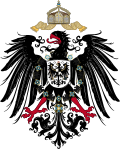
Back فولفغانغ كاب Arabic ولفجانج كاپ ARZ Wolfgang Kapp Catalan Wolfgang Kapp Czech Wolfgang Kapp Danish Wolfgang Kapp German Wolfgang Kapp Esperanto Wolfgang Kapp Spanish Wolfgang Kapp Basque ولفگانگ کاپ Persian
Wolfgang Kapp | |
|---|---|
 Wolfgang Kapp | |
| Member of the Reichstag for Gumbinnen 2, East Prussia | |
| In office 2 February 1918 – 9 November 1918 | |
| Preceded by | Fritz Gottschalk |
| Succeeded by | constituency abolished |
| Personal details | |
| Born | 24 July 1858 New York City, New York, United States |
| Died | 12 June 1922 (aged 63) Klinikum St. Georg, Leipzig, Weimar Republic |
| Nationality | German |
| Political party | German Fatherland Party German National People's Party |
| Spouse | Margarete Rosenow |
| Children | 3 |
| Alma mater | Eberhard Karls University of Tübingen Georg-August University of Göttingen |
| Occupation | Civil servant, politician |
| Profession | Lawyer |
| Signature | |
| This article is part of a series on |
| Conservatism in Germany |
|---|
 |
Wolfgang Kapp (24 July 1858 – 12 June 1922) was a German conservative and nationalist and political activist who is best known for his involvement in the eponymous 1920 Kapp Putsch. He spent most of his career working for the Prussian Ministry of Finance and then as director of the Agricultural Credit Institute in East Prussia. During World War I, Kapp was a vocal annexationist and critic of the government's policies, which he saw as not aggressive enough. His strong dislike of parliamentary government and the Weimar Republic led him to take a leading role in the 1920 putsch that bears his name. Following the putsch's failure to overthrow the German government, Kapp went into exile in Sweden. He returned to Germany in late 1921 to appear in court, but died while under medical care before he could testify.
© MMXXIII Rich X Search. We shall prevail. All rights reserved. Rich X Search